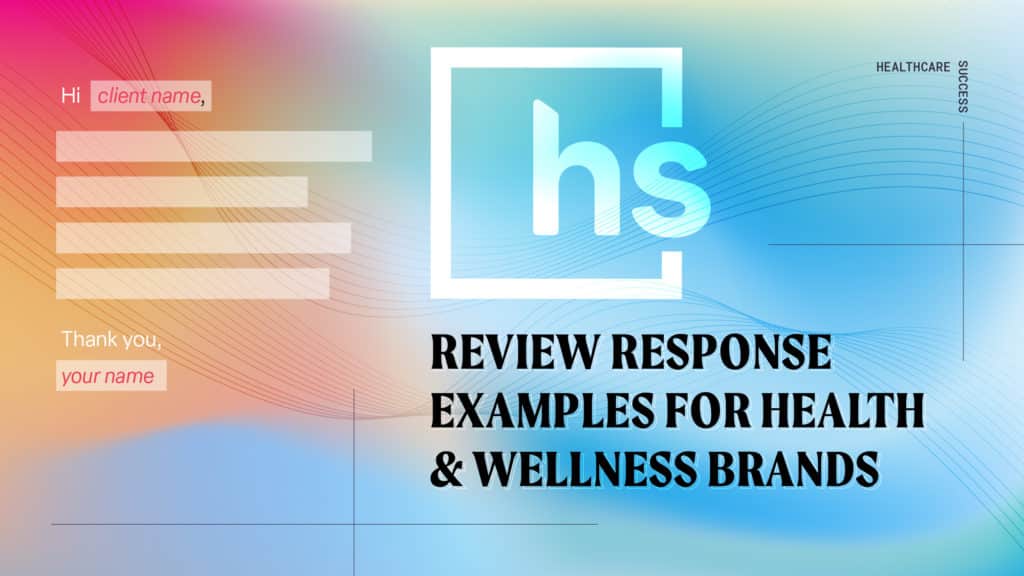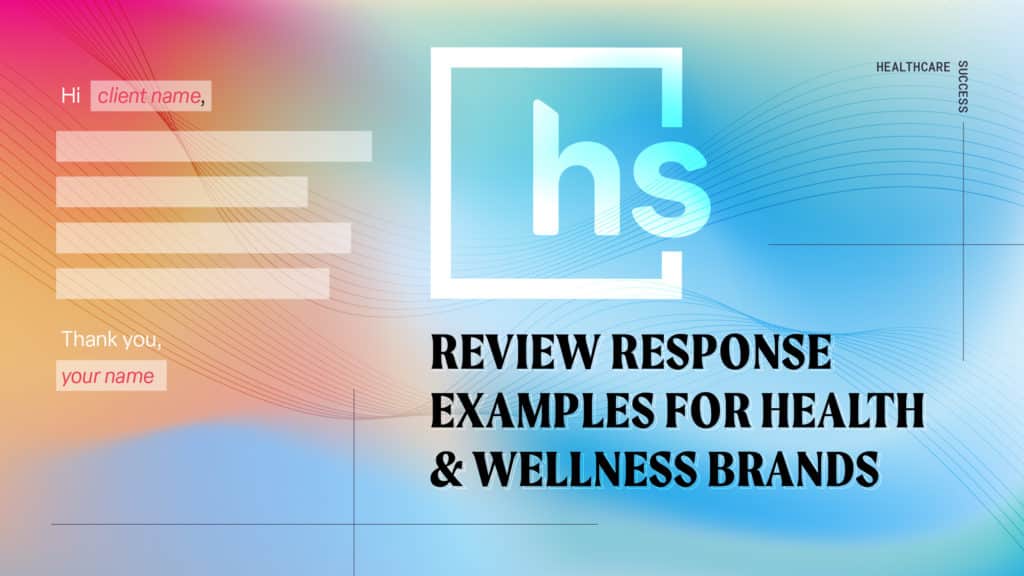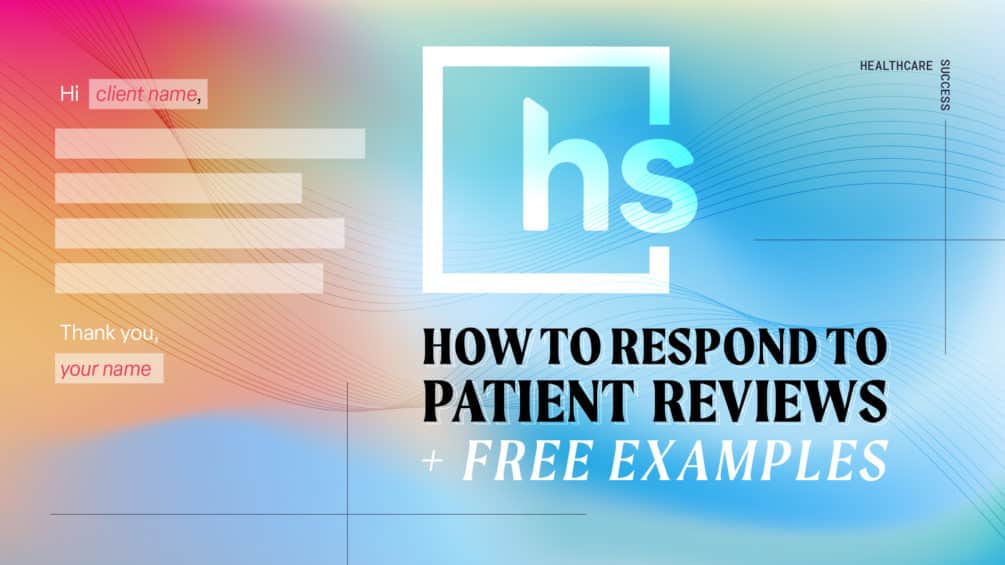How to Respond to Patient Reviews (+ Free Examples)
It’s easy to find detailed guides on how to respond to reviews. However, most aren’t written specifically for healthcare, meaning they don’t consider HIPAA or other compliance issues.
Responding to patient reviews can be tricky.
According to HIPAA, hospitals and doctors aren't allowed to share any protected health information (PHI) about reviewers—including whether they're patients.
To offer further discouragement from violating HIPAA, anyone who knowingly obtains or shares individually identifiable health information may face a criminal penalty of $50,000 and up to one year in prison.
Knowing this, your health or wellness brand might hesitate to engage with any online review. However, responding to all negative, mixed, positive (and, yes, even fake) reviews is vitally important.
Here’s why:
- It improves local SEO.
Managing and responding to customer reviews about your business is one way to improve your local ranking on the Google platform. - It builds trust and credibility.
Proactively responding to all types of patient reviews is a tangible example of why patients can trust you. It shows that you’re committed to delivering a positive patient experience for everyone who visits your business. - It improves brand loyalty and patient retention.
Responding to positive reviews strengthens the relationship between the customer and the brand, which improves trust and retention. Likewise, responding to a negative or mixed review in a helpful, sincere way is a positive step toward repairing the problem and improving your online reputation.
A proactive reputation-management strategy allows you to respond to all reviews thoughtfully and quickly.
In this post, I’m sharing helpful prompts to guide you in writing your responses to customer reviews. These templates are meant to be customized for each response. Doing so will improve your review response strategy and online reputation.
Disclaimer: These writing prompts are meant as a springboard to help you get started. Beware of violating HIPAA regulations, and always check with your attorney for advice regarding these responses or any others you post online.
But first, we’ll review best practices and how to respond with HIPAA in mind.
Your Guide to Healthcare Review Responses
Your patients—and potential patients—are researching your business online. Do you know what they’re finding out about your business practices?
If not, it’s time to start paying attention and responding to reviews. Why?
84% of people trust online reviews as much as friends and family.
Here are some of the sites where they’re searching:
HIPAA Best Practices for Review Responses
Maintaining HIPAA compliance across every consumer touchpoint (at all times) is essential for protecting sensitive patient information and your business from steep fines and potential lawsuits. Including times patients willingly share this information in their online reviews.
Always protect patient privacy and project a professional, caring voice.
Here are our best practices for responding to patient reviews to ensure HIPAA compliance:
- Thank the reviewer for their feedback—the good, the bad, and the ugly.
- Avoid using protected health information (PHI), including any information that someone can use to identify a patient, including the individuals:
- Name
- Email address
- Phone number
- Birthdate
- Appointment dates/times
- Test results
- Diagnoses
- Avoid discussing any details or specifics about a patient or their treatments.
- Avoid any language indicating the reviewer has ever been a patient at your facility.
- Avoid any language that could indicate the patient even visited your office.
- Use approved response prompts that address common scenarios and customize them as needed.
- Focus on the positive and craft responses that show your dedication to improving the patient experience.
- Provide contact information (e.g., direct emails or phone numbers) to take the conversation offline. This helps you avoid engaging with negative reviewers or provoking further public online discussion.
Best Practices for Responding to Patient & Consumer Reviews
The top two best practices to consider when writing review responses are always:
- Write unique and sincere answers.
- Never include personal information.
Before drafting any response, consider your brand tone and voice. Take special care to ensure your reply is in line with your business. For example, responses from smaller, physician-owned medical practices will be naturally warmer and more familiar than a larger organization or hospital system.
Pitch Perfect Review Responses Are Just a Click Away
Download Your FREE Templates Now

Best Practices for Negative & Mixed Reviews
Never respond immediately, especially if you’re dealing with a negative review, as it could cloud your judgment and affect the quality of your response.
Take time to plan your response.
- Never ignore honest reviews—especially when they’re negative.
- Never delete negative reviews.
- Avoid asking patients to remove or alter a review.
- Always be gracious and acknowledge the patient for taking the time to write a review.
- Do not apologize publicly; avoid any comment construed as an admission of a mistake.
- Use approved response prompts that address common scenarios and customize them as needed.
- Address their concerns directly using company policy. For example, if a patient writes about long wait times, address it directly in your reply, “We aim to see all patients on time.”
- Focus on the positive and craft responses that show your dedication to improving the patient experience.
- Keep it short and sweet. Provide contact information (e.g., direct emails or phone numbers) to take the conversation offline. This helps you avoid engaging with negative reviewers or provoking further public online discussion.
- Let the reviewer know the appropriate team is available should they need further assistance.
- Include the next steps and, if needed, your direct contact information so the reviewer can follow up with you if they want to discuss more offline.
- Thank the reviewer again.
- Sign a real name at the end of your response.
Special consideration for fake reviews.
If you diligently monitor your online reviews, you can quickly identify fake reviews that violate the online review site’s policies.
While we recommend responding to fake reviews in a way that encourages further offline, one-on-one communication, you should also request to have them removed. Google makes it easy for businesses with a Google My Business profile to request a review removal.
Best Practices for Positive Reviews
Positive feedback is an excellent opportunity to reinforce the excellent review and build on your brand.
- Thank the reviewer for sharing their thoughts.
- Avoid discussing any details or specifics about a patient or their treatments.
- Use approved response prompts that address common scenarios and customize them as needed.
- Remind the reviewer that a positive experience is your top focus.
- Thank the reviewer again.
- Sign a real name at the end of your response.
Bonus tip: Include one targeted keyword or keyword phrase (e.g., business name, location, products, or services) to support SEO optimization.
Pitch Perfect Review Responses Are Just a Click Away
Download Your FREE Templates Now

We hope these guidelines will help you respond to online feedback in a professional, helpful, and HIPAA-compliant way that both protects your brand reputation and communicates that you care about your customers.








